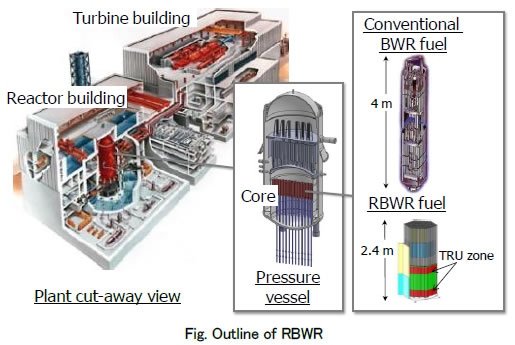Information contained in this news release is current as of the date of the press announcement, but may be subject to change without prior notice.
August 28, 2014
Aiming for development of Next-Generation Nuclear Reactors that effectively use
radioactive waste materials as fuel
Tokyo, Japan, August 28, 2014 --- Hitachi, Ltd. (TSE:6501, "Hitachi") announced today that they have begun joint research with three American universities - the Massachusetts Institute of Technology (MIT), the University of Michigan (U-M), and the University of California, Berkeley (UCB) - aimed at using Transuranium Elements (TRUs*1) as fuel, and the development of Resource-renewable Boiling Water Reactors (RBWRs) that enable the effective use of uranium resources. Through this joint research, Hitachi plans to evaluate the performance and safety of RBWRs, which is being developed by Hitachi and Hitachi GE Nuclear Energy Ltd., and to study plans for testing with a view toward practical applications with each university.
The uranium fuel used in nuclear power plants contains TRUs, which are harmful to humans, and it is estimated that it takes about 100,000 years for the radioactive properties of these materials to decay to the level of uranium ore in its natural state. If TRUs could be effectively removed from these spent fuels, then the period of decay for the remaining radioactive waste materials could be reduced to just a few hundred years. For this reason, research and development is being conducted throughout the world targeting nuclear reactors that can achieve nuclear fission in transuranic waste.
As one solution to this challenge, Hitachi has undertaken the development of RBWRs based on Boiling Water Reactor technologies, which already have an extensive track record of applications in commercial nuclear reactors. RBWRs could potentially use TRUs separated and refined from spent fuel as fuel along with uranium. Although RBWRs use new core fuel concepts to burn TRUs, they use the same non-core components as current Boiling Water Reactors (BWRs), including safety systems and turbines. As such, RBWRs are unique in that extensive experience accumulated through the application of BWRs can be leveraged to achieve efficient nuclear fission in TRUs.
Hitachi conducted joint research targeting RBWRs with MIT, U-M, and UCB from 2007 to 2011, evaluating safety and performance in the burning of TRUs, as described above. In this next stage of joint research, utilizing the knowledge and insights acquired through the previous stage, and applying the more accurate analysis methods developed by MIT, U-M, and UCB, Hitachi will continue to evaluate the safety and performance of the new reactors, and will study plans for tests with a view toward practical applications.
Hitachi will continue to apply highly reliable Monozukuri technologies to provide support for the stable supply of low-carbon energy with minimal environmental impact, while at the same time striving to further improve safety and reduce the burden of radioactive waste processing. In this way, they will contribute to the resolution of the medium- to long-term issues facing the nuclear power industry.

Hitachi, Ltd. (TSE: 6501), headquartered in Tokyo, Japan, delivers innovations that answer society's challenges with our talented team and proven experience in global markets. The company's consolidated revenues for fiscal 2013 (ended March 31, 2014) totaled 9,616 billion yen ($93.4 billion). Hitachi is focusing more than ever on the Social Innovation Business, which includes infrastructure systems, information & telecommunication systems, power systems, construction machinery, high functional materials & components, automotive systems, healthcare and others. For more information on Hitachi, please visit the company's website at http://www.hitachi.com.